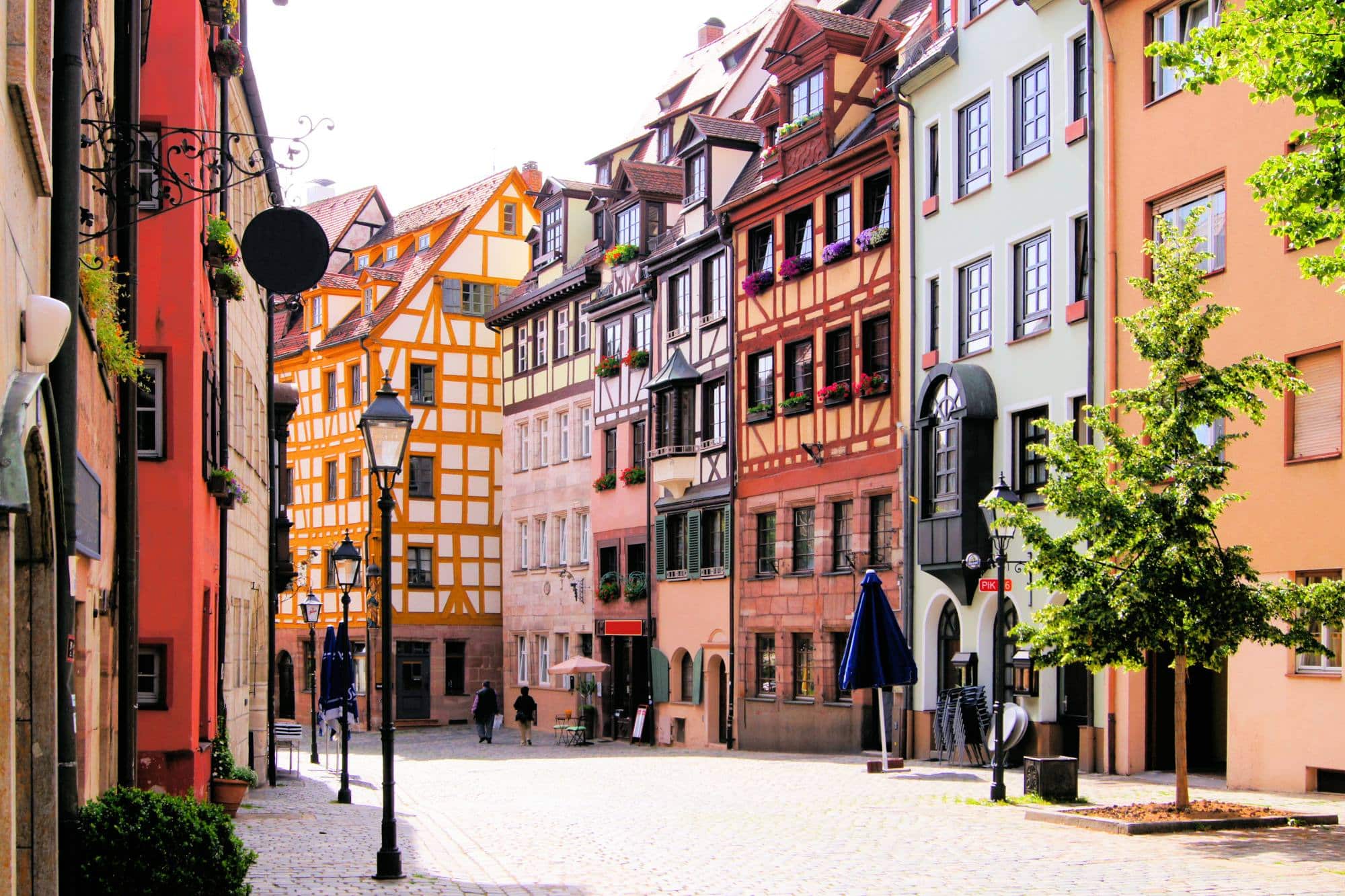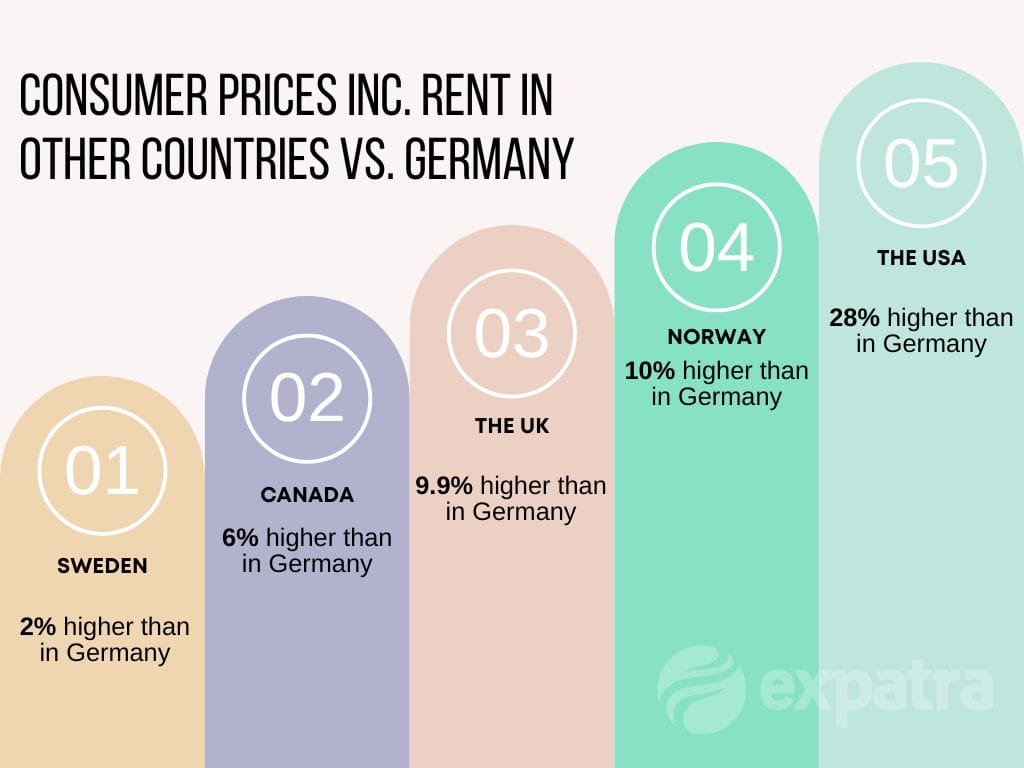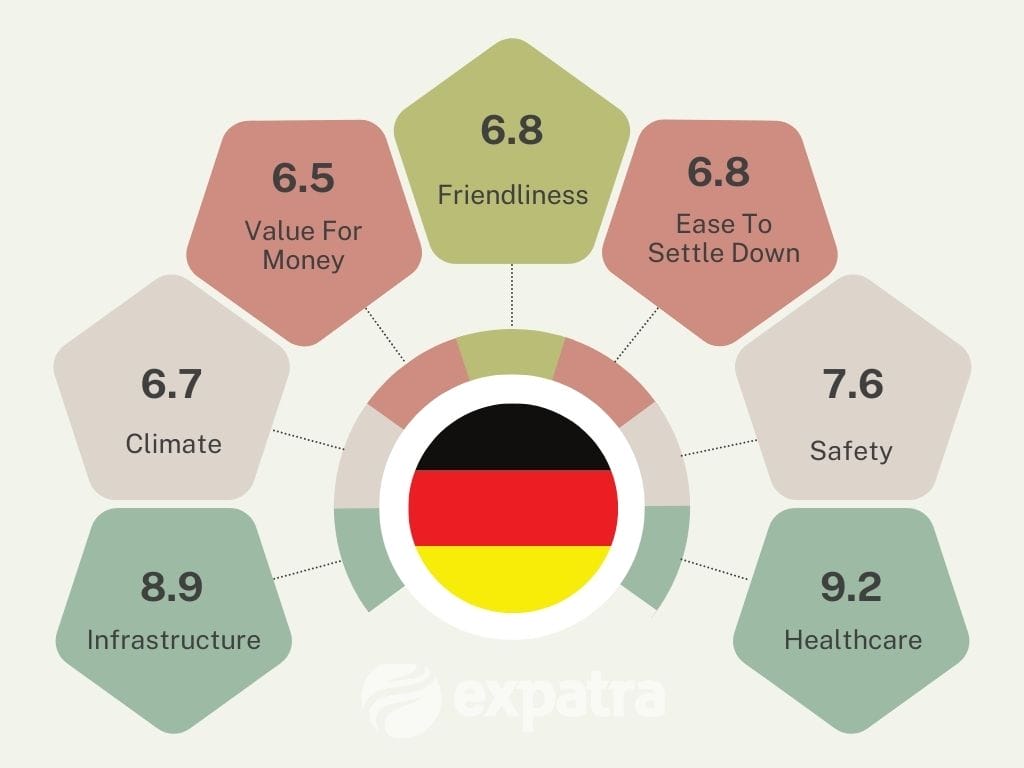If you want good European weather, a high quality of life, and a very stable economic environment, it's hard to go past Germany.
Welcome to our guide for expats in Germany, including information on what to expect, how to get residency, the cost of living, healthcare, public transport, the unique German mindset, and some very handy tips from the author - an expat resident in Germany for over 20 years.
Secure Peace of Mind with Best-Value International Health Coverage
International Citizens Insurance provide free, no-obligation quotes from the leading international health insurance providers with plans tailored to meet your needs. Trusted by thousands of expats worldwide.
In this guide:
- Germany's highlights
- The legalities of moving to Germany: visas and residency options.
- The cost of living: monthly expenses, rentals, and real estate.
- Germany as a retirement destination.
- Infrastructure: travel connections, public transport, internet.
- Healthcare and education.
- Taxes and bank accounts.
- Where to live in Germany – an overview of the most popular expat locations.
- The pros and cons, and tips for moving.
Germany's highlights

High quality of life: Germany is near the top (at times even at the top) of many rankings for quality of life. It’s got lots to boast about - a modern economy with big companies, highly skilled workers, and far lower-than-average unemployment.
The country’s rich heritage and culture: Germany's cultural appeal lies in its rich history and forward-thinking contemporary art, music, and culinary scenes.
Good public infrastructure: Strong public transportation system that makes it easy to get around; high-quality healthcare, low crime rates, and great public education.
English is widespread, making it easy for expats with little German to settle in. It has become increasingly more challenging to find a person that doesn’t speak English.
Cultural uniqueness: The cultural differences between Germany and your previous home country might take some getting used to, particularly regarding things like punctuality, tolerance, and how you should back away from a confrontation.
Tolerance: As for religion, race, and foreign culture, Germany has successfully built on a culture of integration, empathy, and understanding. Just be careful not to root for the wrong football team when you watch a match with your friends or in a stadium.
Visas and residency options in Germany
You need a residence permit or Aufenthaltstitel if you want to live in Germany for an extended period of time.
Work visa
The work version of a residence permit is valid for the duration of your employment contract plus two months. You will need to apply for a residence permit extension if you wish to stay in Germany for longer than this and a permanent/ retirement residency for an indefinite stay.
Self-employed visa
If you are self-employed, you will not need to apply for a work residence permit. You will need to register yourself as a self-employed individual with the German tax authorities. In this case, you will be eligible to enjoy a number of tax benefits for the first two years of your stay in Germany.
Note: the income tax in Germany is lower for self-employed people than it is for employees.
Retirement visa
You apply for a general resident's permit and select 'retirement' as your category. You will need the documents confirming your pension and retirement status instead of the employment-related documents.
The documents for the application process
- Income or significant assets/savings (i.e., you can prove you are financially covered). This is sometimes called a financing plan or, in the case of self-employment, a revenue and business plan. You probably guessed by now that the more papers you prepare, the better.
- Health insurance
- Proof of address in Germany - you are bound to have records from the local municipality that you will have to copy. If you don’t have one yet, you can write a statement on your plans on where you plan to rent or purchase one. The same applies to bank accounts and the aforementioned health insurance.
- An employment permission form or your company registration papers if you are self-employed
- A job description document. Imagine a CV but applying as a citizen of a country.
- Anything you would need with any new passport. A photo, money for fees (~EUR 100), your old passport and documents, etc. It’s best to hand in a copy of virtually anything that makes sense: a birth certificate, criminal records, a bank statement, basically everything short of a fingerprint and mugshot.
You are in the green once you have a stack of papers resembling a police case. While this might seem like overdoing it, it will avoid unnecessary forths and backs, and any unnecessary documents will simply be omitted.
Registering with the local authorities
After arrival, you must register with the local authorities within two weeks. To register, go to the registration authority of your municipality and show a valid ID card, passport, or substitute document and a confirmation letter from the landlord providing the residence (meaning you need a rental contract to be able to register!).

The registration provides you with a registration certificate, which is required for various administrative tasks such as obtaining a residence permit, opening a bank account, or finding a job.
During the registration, you will also receive a tax ID (steuerliche Identifikationsnummer) from the Federal Central Tax Office. Your employer will use this number to determine your income tax rate, and it may also be needed for health insurance or pensions.
Permanent residency in Germany
Once you have a temporary residence visa, you can target permanent residency. This is what you need for it:
- Five years of uninterrupted residence in Germany with secure livelihood (i.e., money or income) and health/social insurance.
- No criminal record. If you do have one, expect some forth and back, but it’s not impossible, as most guides might trick you into believing. The world isn’t that black and white, after all.
- B1 level German and basic knowledge of the local law. The latter is usually listed in forms but is more of a polite warning and doesn’t refer to any actual certification.
The cost of living in Germany
The popular opinion of Germany is that it's an expensive place to live, but it's still more affordable than the USA, for example.
Here's how the cost of living in Germany compares to Northern European and North American countries:

Living in Germany, on average, will set you back by €2,500 a month. Of course, it very much depends on the location and the lifestyle you are used to.
Housing
Renting a property in Germany is a common practice. There are more residents living in rented accommodations than those who own a property.
Rent on an average inner-city apartment in Germany is €1300 a month, but rent on a rural apartment is much cheaper, coming in at around €600 a month.
Here is the average rent for a 2-bed apartment in the city center in various cities:
| City | Rent |
|---|---|
| Berlin | 1500€ |
| Munich | 1800€ |
| Frankfurt | 1600€ |
| Hamburg | 1700€ |
| Cologne | 1400€ |
| Stuttgart | 1500€ |
| Düsseldorf | 1600€ |
| Leipzig | 1200€ |
| Dresden | 1100€ |
| Nuremberg | 1300€ |
Please note that these rental prices are approximate and can vary depending on the specific location and property conditions.
Utilities
Utilities in Germany are pricey, with the average monthly outgoings coming to roughly €250, including internet, mobile, and TV.
Eating out
Eating out in a restaurant is not very expensive in Germany, with a typical main meal costing around €12.50. Traditional dishes like bratwurst and käsespätzle are around half the price they are anywhere abroad.
Pro-tip: amazon.de has a lot of great stuff, but so does amazon.co.uk and amazon.com, and prices can differ greatly. This is true for a lot of events, shops, and offers. Music festival tickets for festivals in Germany are cheaper when bought on the Austrian version of the same festival website (.at). Sounds weird, but it is good to know.
Germany as a retirement destination
Germany is an excellent place to retire if you love climate diversity and four seasons a year to enjoy!
According to the Expatra Global Retirement Index, Germany is in our top 20 countries to retire abroad, and for a good reason.
The index is based on the Expatra Global Retirement Survey that asks international retirees to rate their retirement destination’s infrastructure, climate, ease of settling down, value for money, friendliness, and other aspects of life in their retirement destination.
Here's how Germany scores:

There are many great cities like Berlin, Munich, Hamburg, Dusseldorf, etc., that have a cosmopolitan feel, a good choice of international restaurants and pubs, and a wide range of cultural events and activities to enjoy.
The countryside, on the other hand, is home to many quiet villages, small towns, and tiny hamlets surrounded by amazing nature.
The cost of living in Germany is higher than in most other European countries, so you may wish to investigate locations outside the big cities and give the countryside a chance.
German residency is possible through a retirement visa (see the section below), but you’ll need to have a monthly income of at least €1,000.
How much money do you need to retire in Germany?
On average, a pension of around $1,800 would give you a decent lifestyle in Germany. While more wouldn’t hurt, it certainly qualifies to settle here.
Quick note: you won’t get double taxed in any case or scenario, but you will have to keep tidy records of where your money comes from, whom you paid, how much tax, etc., be it pension, salary, or inheritance.
Retirees also benefit from grants offered by the German government, such as free public transportation (for seniors over the age of 60) and reductions in tax for homeowners.
Plan a little extra for specialists. German healthcare covered a lot, but not all. One such example is dental care.
There are also cases of waiting for a donor organ longer if you are on public healthcare. It’s not as bad as you might fear, but it needs to be mentioned as well.
Retirement residency in Germany
Germany does not have a visa specifically for pensioners. Still, a ‘retirement residency visa’ (or something along these lines) is often advertised. That’s because applying to live in Germany post-retirement is fairly straightforward.
First, you apply for a general resident's permit and select 'retirement' as your category.
You will pretty much do the same stuff as for the other visas, safe for the work part. This is replaced with documents of your savings, pension, or similar.
Pro-tip: If you have any work history in Germany, family members, or similar, it will help your case.
If approved, you will receive a temporary Visa. At least, that's what it says officially.
That's because this is supposed to be a test phase of sorts, and after the time is up, you can apply again and finally receive the permanent one. In reality, there are cases where permanent residency is given immediately or after a shorter period of time.
Either way, expect to visit embassies, send letters, and check your emails quite a few times.
Public transport
Germany has a well-developed public transportation system:
- Trains: The Deutsche Bahn (DB) operates an extensive rail network throughout Germany. Ticket prices vary based on the distance traveled and the type of train. For example, a one-way ticket for a short regional train ride could cost around €5-15, while long-distance ICE trains can range from €30-100 for a one-way trip.
- Buses: Regional and long-distance bus services. Companies like FlixBus, Eurolines, and MeinFernbus offer affordable bus travel options. Prices depend on the distance and route, but a short bus trip within a city would typically cost around €2-5, while longer journeys between cities can range from €10-30.
- Trams and Light Rail: Operate in cities, including Berlin, Munich, and Frankfurt. Prices for tram rides are usually integrated with other public transportation systems in the city. Single tram tickets typically cost around €2-3, and day passes for unlimited tram travel can range from €5-10, depending on the city.
- Subways and Metro Systems: Major cities in Germany, such as Berlin, Hamburg, and Munich, have subway and metro systems. Ticket prices for these systems are usually integrated with other forms of public transportation. A single trip in the subway or metro can cost around €2-3, and day passes for unlimited travel within the city range from €5-10.
While Germany offers a robust public transport network, there are some rural areas or remote villages where having a car might be more necessary due to limited public transport options. However, in most major cities and towns, it is entirely possible to live without a car.

Internet
The most common type of internet connection in Germany is DSL. However, there are other providers that also offer cable and fiber optic connections. Here are the options:
- DSL (Digital Subscriber Line): from 16 Mbps to 250 Mbps, prices start at around €20 but can go up to €50 or more for higher speeds.
- Cable Internet: from 30 Mbps to 1 Gbps or more, prices start at around €20 and can go up to €60 or more for faster speeds.
- Fiber Optic (FTTH/FTTB): from 100 Mbps to 1 Gbps or even higher. Prices start at around €30 and increase significantly for higher speeds.
- Mobile Internet (LTE/5G): LTE speeds typically range from 10 Mbps to 150 Mbps, while 5G speeds can reach up to 1 Gbps or more (availability may be limited). Prices can start at around €10 per month and go up to €50 or more for larger data plans.
- Satellite Internet: from 10 Mbps to 50 Mbps with monthly costs starting at around €30 and potentially going up to €100 or more.
Urban centers and big towns, as a rule, have decent internet connections.
However, in rural areas, you might experience a lack of infrastructure development and fewer ISPs. Some mountainous regions, like the Bavarian Alps or the Black Forest, face similar challenges.
How to open a bank account in Germany
You will need a valid passport or another valid document proving your identity: a national identity card or a driving license.
You will also need a document proving your address. For some banks, but not all, that will have to be in Germany. Other than that, you may need to fill out a form or five that they will give you, and some banks may even request a photograph of you.
They will also run an extensive background check (without telling you, but to be fair, it's to be expected). You will be asked to give your personal details and information, such as your date of birth, and you will have to show up in person for most institutions (i.e., no remote registration).
Spend some time picking your favorite bank.
Banks are quite competitive, and the sheer mention of signing up with someone else might even get you more favorable conditions.
Play hardball when the mood seems right for it, and once you sign the papers, don't forget about them.
Banks will go to great lengths to keep you as a customer and, just a few years down the line, might reward you for not switching to the competition - if you give the impression that you might.
Taxes in Germany
Here is a list of some taxes that you, as a German resident, must pay:
- Income Tax (Einkommensteuer): The income tax rates in Germany range from 0% to 45%, depending on your income level. The first €9,984 is tax-free. The tax is progressive, meaning that the more you earn, the higher the tax rate. Pension income is subject to the same rates.
- Solidarity Surcharge (Solidaritätszuschlag): This is an additional fee on income tax, capital gains tax, and corporate tax in Germany. The rate is currently set at 5.5% of the income tax.
- Value Added Tax (Mehrwertsteuer): Germany has a VAT system with different rates. The standard rate is 19%, which applies to most goods and services. However, there is also a reduced rate of 7% for certain essential items like food, books, and newspapers.
- Capital Gains Tax (Abgeltungsteuer): For capital gains from the sale of securities or investment funds, the tax rate is generally 25%, but exemptions and reductions may apply depending on the holding period and other factors.
- Property Tax (Grundsteuer): This tax is levied on the value of land and buildings. The rates vary depending on the municipality and are calculated based on a property's assessed value.
Healthcare in Germany
To get health insurance in Germany, you need to be a resident. You must visit your local health insurance office, which is different for every state (KV = Krankenversicherung, BVA = Bundesversicherungsanstalt).
Public health insurance
Public health insurance in Germany is known as "Gesetzliche Krankenversicherung" (GKV). The costs are based on your income.
Who is eligible:
- Employees with a gross income below a certain threshold (currently around €€66,600 per year in 2023)
- Self-employed individuals and freelancers
- Students
Private health insurance
Germany’s private health insurance (PKV) offers the same level of care as the public system but provides more medical and dental choices, shorter waiting times, and often a higher level of service.
Who is eligible:
- Employees with salaries over a certain threshold (currently €66,600)
- Self-employed
- Over 55 and retired.
Private health insurance costs are based on medical risk. So, you may need to undergo medical exams before enrolling, and the amount you pay could be higher, especially as you get older.
Non-German health insurance
You don't need German health insurance for a residence permit. Any health insurance that meets the requirements is sufficient. Germany has strict rules for non-German health providers. Some policies may not be accepted if they don't follow local reimbursement limits or deductibles.
It's important to check with your provider that your plan fully qualifies you for a residency permit.
You can also complement German or foreign insurance with the other. If you are considering international health insurance, compare international health insurance options from various providers to find the best deal.
If you are on a lower budget, the German version will likely be the most cost-effective. Remember the fierce competition mentioned in the how-to-open-a-bank-account section just above? It's three times worse for insurance of any kind.
True story: I once invited an insurance representative of four different agencies (one each) to come to my home to give their pitch. None of them knew three more people would show up to give the same pitch. I politely invited them into the living room, served some drinks, and watched what resembled an episode of Game of Thrones or a very heated political discussion unfold.
After a while, it turned into a bidding war with me as the prize. Needless to say, the conditions I was offered turned out quite a lot better than what my neighbors ended up with.
Tip: Contributions to health insurance are completely tax deductible as long as these contributions are paid for primary basic healthcare.
British citizens with S1 form
If you are a British national moving to Germany and eligible for an S1 form, you should ask for an S1 form from the NHS Overseas Healthcare Services. You can ask for the form to be sent to your UK address if you need it for your visa application.
The S1 form will be converted into a health insurance card by your selected German statutory health insurance provider (public insurance). This will give you access to all the treatments and services available to people in Germany who are insured by the same health insurance provider.

Schools and education
In general, German education is highly regarded and offers a strong foundation for students.
Expat children are generally eligible to attend state-run schools in Germany. They are free of charge and offer education primarily in German.
Other options include:
International schools
These schools are accredited by NEASC and ECIS, often providing the International Baccalaureate. Some also offer American high school diplomas, British A Levels, and occasionally the German Abitur.
Costs differ by school, reaching up to €16,000 annually for high school students, while preschool and elementary grades may cost 30 to 50 percent less.
Private schools
These schools can run various programs and even be bilingual, combining German language education with another language, typically English.
Private schools are funded by fees and state subsidies. By law, they cannot discriminate against poorer households or make a profit, so in general, they are quite affordable.
Each state in Germany decides whether the schools can charge tuition fees. The most populous state, North Rhine-Westphalia, for example, does not allow fees but instead subsidizes alternative schools relatively generously.
Church-run schools tend to be the most affordable because they are largely financed by the churches.
Tip: Parents can deduct up to €5,000 in school fees from their taxes for each child annually.
Driving in Germany
The roads, for starters, are usually top-notch. German drivers are also very disciplined, as a rule.
You will find roundabouts everywhere, and driving on the Autobahn - the German highway system - is always a pleasure. You will see plenty of people camped out in lay-bys when the weather is good, and there are plenty of speed limits to keep things interesting.
That's right, not everywhere in Germany can you go as fast as you want despite popular belief. There are increasingly more sections with limits, a trend that has slowly gained pace.
Driving from the far west to the far east, you will see speed limits dropping from about 130 km/h to as low as 70 km/h. Not to mention the number of speed traps all over the country.
In fact, the German police might just be the most active force for catching speeders.
Download an app that warns you of these so-called "Radarfallen" aka. radar traps, and check your route ahead of your drive if it isn't your usual commute.
There are also a lot of construction projects temporarily changing the rules, such as speed and parking.
New cars are usually a tad overpriced at dealerships. Opting for the second hand can lead to saving 50%+ on virtually the same car, even if it has only been driven for a thousand miles.
Warning: Don't go for mid-modern models. Either get an old-timer (they get a break from most regulations) or something very new (which will get tax reductions and won't suddenly become more expensive for seemingly random reasons), especially if it is electric. Tesla has been very active in building charging stations all across central Europe.
Where to live in Germany
Germany is a country known for its diverse regions, each offering unique landscapes, climates, and leisure activities.
In the northern regions along the Baltic and North Sea, you will find serene beaches and pretty seaside towns. The climate tends to be milder, with cooler summers and relatively mild winters. These areas are ideal for outdoor enthusiasts who enjoy activities like sailing, windsurfing, and cycling along the scenic coastal paths.
Moving towards the center of the country, the landscapes transform into rolling hills, lush forests, and historic cities. Regions like Bavaria and Baden-Württemberg are particularly popular among retirees and nature lovers.
The alpine regions offer breathtaking mountain scenery, perfect for hiking, skiing, and mountaineering. The climate varies from cool summers to cold winters, making it an excellent choice if you appreciate four distinct seasons.
Germany's national parks and nature reserves are a big draw for active outdoor fans. Whether it's hiking in the Black Forest, canoeing along the rivers in Brandenburg, or mountain biking in the Harz Mountains, there are countless trails and outdoor activities to enjoy throughout the country.
For city lovers, cities like Berlin, Hamburg, Nuremberg, and Munich offer a wide range of cultural and historical sites, museums, and entertainment options suitable for all ages. Plus, Germany's efficient public transportation system makes it easy to explore these cities and their surroundings.
Let's have a look at the average property prices in the most popular regions in Germany:
| Region | Description | Average Property Price |
|---|---|---|
| Bavaria | Beautiful region known for its natural landscapes | €550,000 |
| Rhine-Neckar | Boasts a mix of historic towns and vibrant cities | €420,000 |
| Black Forest | Surrounded by picturesque mountains and forests | €400,000 |
| North Sea Coast | Coastal region with charming seaside towns | €450,000 |
| Harz | A mountainous region offering plenty of outdoor activities | €300,000 |
| Franconia | Rich in history and medieval architecture | €350,000 |
| Saxon Switzerland | Famous for its stunning rock formations and hiking trails | €380,000 |
| Moselle | Known for its scenic vineyards and charming villages | €320,000 |
For more information about Germany's various locations, visit our guide to the best places to live in Germany.
The pros and cons of living in Germany
There are many reasons to choose Germany as your new home: it has a rich history and culture, gorgeous scenery, a diverse population, and it is a major economic powerhouse.
The reasons not to choose Germany are few and far between, but there are some.
Here is a quick overview of the pros and cons of living in Germany.
The pros of living in Germany
1. Tolerant society
Germany is highly liberal, open-minded, and infamous for its tolerance-first approach. Be it religion, race, sexuality - you name it.
2. Not that pricey
Germany has lower costs than you might expect, especially when compared to the wages – rent, food, entertainment, transportation, clothing, etc. is much less than most places of similar development (e.g., the US and UK).
3. A high standard of living
Known for great healthcare and education (amongst the best in the world), Germany is also among the countries with the lowest rates of corruption
4. Stable environment
Germany is a well-regulated economy, allowing for low-risk investment with a very pro-business regulatory body coupled with a generally very hard-working, industrious population. As such, great effort and labor, in general, is highly respected.
Germany has a rare dual education system where you can opt for an apprenticeship instead of going to university.
5. Good roads, good traffic
There is an abundance of affordable public transport options in all major cities of Germany, which can also be navigated easily on maps, heeded from Deutsche Bahn (railway company). Traffic jams do happen, however.
Pro traffic tip: If you must commute during rush hours or when the highway is blocked due to an accident, try to opt for a motorbike. Nothing fancy. If it can go at least 60 km/h (38 mph), it may drive on the highway. There is ample space for bikes to pass by, while cars may temporarily turn into tortoises. While this is rare, it is an incredibly satisfying feeling to fly through traffic on German highways!
Pro traffic tip 2: If you need to travel a long distance on a budget, give buses a chance. Companies like ‘flexbus’ are considerably cheaper than going by rail. The same can be said about car-sharing apps.
The cons of living in Germany
1. A delicate balance of powers within a delicate balance of powers
After a long period of Merkel's stability-first politics coming to an end, Germany’s future politics are anyone's guess. Each part of the country has its own plans, and then there is Brussels and every EU member around the land of the Bratwurst.
What’s relevant for expats and settlers is that unwelcome changes in pensions, taxes, and other laws and regulations are very likely.
2. Not so cheap after all
Wealth doesn’t scale well in Germany. The more money you earn and spend, the harder you are taxed. This is also reflected in the disproportionately expensive luxury goods such as fancy meals or front-seat tickets at events.
3. Not so green after all
There is degradation and contamination of many natural springs, forests, land, and nature in general. A lot of environmental politics have suffered under the pressure of other priorities.
An example of this is a lot of recycled material ending up in the same incinerator, after all, making it more of an environmental theatre than actual green mechanics. That said, Germany is still a leader when it comes to preserving the planet - especially when compared to the US or China.
4. A German version of English
People tend to speak their own version of English. Older generations will directly translate idioms and phrases, ending up with gibberish, while younger folk will start mixing both or using a lot of pop culture references, which is often referred to as "Denglish”.
5. Romantically conservative
Germans tend to be more reserved than other cultures. Save for the wild nightlife, the dating scene is certainly a lot more reserved than popular opinion might lead you to believe, and it can be hard to break the ice at times
6. Offspring rules are complicated
Child-rearing laws are pretty strict, and as you might have expected - lots of bureaucracy
7. Southsiders
Most activity happens in the south. If you're looking for solitude, head north.
8. Taxes or taxes
Americans are infamous for being taxed through the seven hells. Death or taxes, as the saying goes.
Germany isn’t far off. Taxes are scaled but comparatively high, even at the lowest of tax classes.
Salaries can get taxed up to 50%, and there are multiple additional taxes, such as a whopping 19% value-added tax, and other hidden costs, such as paying a fee for television even if you don’t own one (“GEZ”).
9. A rule. I like it. Another one!
Constant changes in regulations and very strict enforcement. This is a bit of a wild card and can be both a pro and a con, but we will opt for the latter.
Your beekeeping house was built 1mm too close to the public dirt road? *Wrecking ball noises*. I personally wish this was an extreme example to illustrate the point, but sadly, it’s a real story. Rules don’t get bent by any margin, even if it would be in everyone's interest.
No matter how much you love or hate it, you certainly can’t deny that German bureaucracy is a beast that takes a lot of getting used to.
The advice would be to read up on the latest rules, try not to break them, and if you do, keep smiling.
German law can be unforgiving, but your parking ticket might get reduced by quite a lot for complying. Also, make sure you do everything online or through the Bundespost/Deutsche Bahn (post/railway) if possible, as this will save you a lot of time and effort.
Final thoughts on living in Germany
Germany is a peaceful garden, a hectic factory, a wild party, and a vivid sports event, but also a caring nurse, an understanding teacher, and a demanding mother. It is this diverse mix that makes the country so fascinating.
Some stereotypes are true, but others only apply if you are willing to stay on the surface.
Here is another German word to think about: Gemütlichkeit. It expresses the truly unique way Germans are. It is the feeling of being comfortable and quickly at home, being taken care of, being at peace with yourself and others, of enjoying the small things in life.
No wonder the Germans have created a word for that: it embodies the German spirit. Have a Brezel, go to the beer festival, and join Gemütlichkeit!
(But beware of the hound that is paperwork and make good use of the locals' spirit for competition).
You might find useful:
Helpful external links:
- All about German education - the German education server site.
- The Federal Portal (Bundesportal) - online services provided by Germany’s federal, state and local governments.
Secure Peace of Mind with Best-Value International Health Coverage
International Citizens Insurance provide free, no-obligation quotes from the leading international health insurance providers with plans tailored to meet your needs. Trusted by thousands of expats worldwide.



